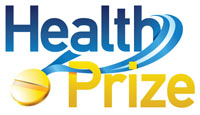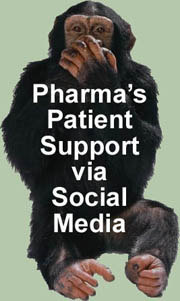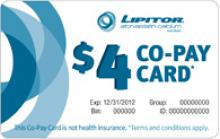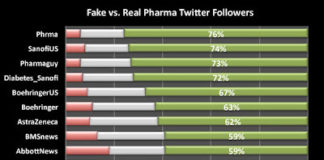Vol. 11, Issue No. 3: 19 MARCH 2012 – EXECUTIVE SUMMARY  Welcome to Volume 11, Issue No. 3 (19 March 2012) of Pharma Marketing News. Thank you for visiting. See the featured article summaries below.
Welcome to Volume 11, Issue No. 3 (19 March 2012) of Pharma Marketing News. Thank you for visiting. See the featured article summaries below.
John Mack, Publisher & Editor
editor@news.pharma-mkting.com
@pharmaguy HealthPrize Teams Up with RealAge to Improve Adherence High Engagement in Reward Program Among Asthma/COPD Patients
 Unless taken, medicines don’t work. That’s how Michael Rosenblatt, M.D., Chief Medical Officer at Merck, expressed it in a comment to a Wall Street Journal Health blog post. Lack of medication adherence is a major issue contributing to poor health outcomes and higher costs.
Unless taken, medicines don’t work. That’s how Michael Rosenblatt, M.D., Chief Medical Officer at Merck, expressed it in a comment to a Wall Street Journal Health blog post. Lack of medication adherence is a major issue contributing to poor health outcomes and higher costs.
“The challenge in changing such behavior is complex, but finding ways to improve patient adherence is a win-win situation for everyone involved in healthcare,” noted Dr. Rosenblatt. “There has never been a better time, nor time of greater need. Now is the time for all of us — patients, doctors, pharmacists, government, insurers, employers and the pharmaceutical industry — to work to solve this problem,” said Dr. Rosenblatt.
HealthPrize Technologies believes it has at least part of the solution, which is to provide an innovative approach with an online and mobile-based program that is fun, engaging and educational.
This article summarizes the results of a six-month asthma and chronic obstructive pulmonary disease (COPD) pilot study in which HealthPrize partnered with RealAge to test patient engagement with the HealthPrize online and mobile platform.
Topics include:
- The healthcare costs associated with non-adherence
- So why is it so difficult to improve adherence?
- Treat People Like People, Not Patients
- The HealthPrize Model
- High Engagement Among Asthma/COPD Patients
- Lessons Learned
Download full article (PDF)
Focus on Drug Safety Communication & TV DTC Advertising A Review of Two New FDA Guidance Documents
 This article reviews two recently published and important guidances from the FDA that concern the dissemination of drug information to consumers.
This article reviews two recently published and important guidances from the FDA that concern the dissemination of drug information to consumers.
FDA’s Center for Drug Evaluation and Research (CDER) issued guidance regarding how the agency will classify and communicate drug safety information (“Classifying Significant Postmarketing Drug Safety Issues” and “Drug Safety Information — FDA’s Communication to the Public”).
FDA’s Office of Prescription Drug Promotion (OPDP, formerly DDMAC) issued guidance regarding mandatory review of TV direct-to-consumer (DTC) ads prior to dissemination (“Direct-to-Consumer Television Advertisements — FDAAA DTC Television Ad Pre-Dissemination Review Program”).
Topics include:
- Safety First
- Not All Safety Issues are Urgent
- Social Media Implications
- Mission: Correcting Misleading Information
- Preview of TV Ads
- Which Ads Will Require “Pre-dissemination” Review?
- The 45-day “Shot Clock”
- What Exactly Will the FDA Review?
- Pushing the Envelope May Be Too Costly?
- A Possible Loophole
Download full article (PDF) US Drug Shortage & Supply Chain Crisis Pharma’s Missed Opportunity to Support Patients via Social Media
 To meet the increasing demand for drugs in short supply, legitimate wholesalers have been found wittingly or unwittingly passing along counterfeit drugs to hospitals, clinics, and physicians desperate for products no matter what the source. The case of fake Avastin has brought this problem into the bright light of main stream media. Authorities investigating the importation of low-cost foreign pharmaceuticals into the U.S. have identified a supply chain that may have allowed fake cancer drugs to reach U.S. clinics.
To meet the increasing demand for drugs in short supply, legitimate wholesalers have been found wittingly or unwittingly passing along counterfeit drugs to hospitals, clinics, and physicians desperate for products no matter what the source. The case of fake Avastin has brought this problem into the bright light of main stream media. Authorities investigating the importation of low-cost foreign pharmaceuticals into the U.S. have identified a supply chain that may have allowed fake cancer drugs to reach U.S. clinics.
Many healthcare experts have suggested that social media can be an important component of patient support. Although many pharmaceutical companies actively use Twitter and other social media tools to push out positive news about their companies and products, very few use these tools for systematic support of patients who depend upon their drugs.
Topics include:
- Can the United States Ensure an Adequate Supply of Critical Medications?
- The Case of Fake Avastin
- Erosion in US Supply Chain Confidence
- Roll of Social Media
- This is No Game!
Download full article (PDF) Do Drug Copay Coupons Drive Up Healthcare Costs? Union Health Plans Say “Yes”
 Coupons for drug co-payments are illegal and drive up long-term health-care costs for all, a consumer group and four trade-union health-insurance plans said in announcing lawsuits against eight pharmaceutical companies. The lawsuits claim that although coupons reduce the consumer’s out-of-pocket cost, the health insurer still pays the previously negotiated price to the drug company. With no savings from generics, health plans will need to charge patients more to keep up with rising costs, the lawsuits say.
Coupons for drug co-payments are illegal and drive up long-term health-care costs for all, a consumer group and four trade-union health-insurance plans said in announcing lawsuits against eight pharmaceutical companies. The lawsuits claim that although coupons reduce the consumer’s out-of-pocket cost, the health insurer still pays the previously negotiated price to the drug company. With no savings from generics, health plans will need to charge patients more to keep up with rising costs, the lawsuits say.
Read more about that here:
http://ec2-54-175-84-28.compute-1.amazonaws.com/pharma-mkting.com/news/pmn113-article04.htm



![6 Digital Tools at the Center of Healthcare Digitalization [INFOGRAPHIC]](http://ec2-54-175-84-28.compute-1.amazonaws.com/pharma-mkting.com/wp-content/uploads/2021/04/6DigitalTools_600px-218x150.jpg)




![6 Digital Tools at the Center of Healthcare Digitalization [INFOGRAPHIC]](http://ec2-54-175-84-28.compute-1.amazonaws.com/pharma-mkting.com/wp-content/uploads/2021/04/6DigitalTools_600px-100x70.jpg)




